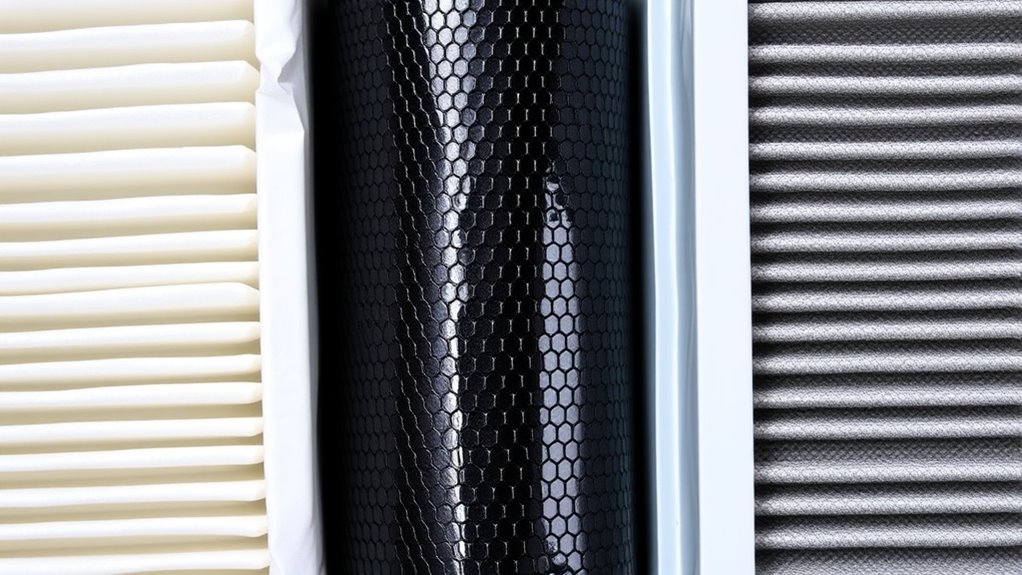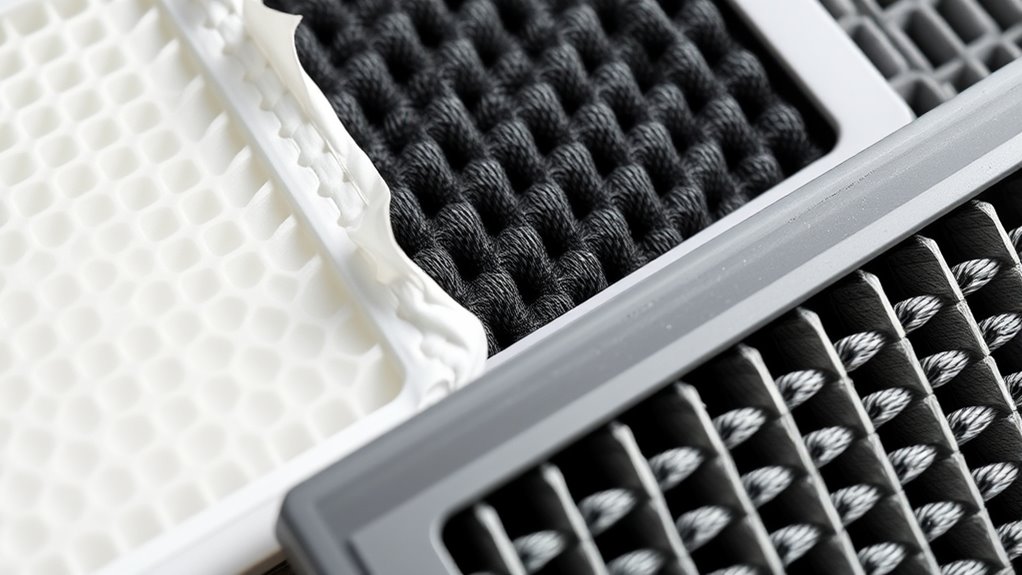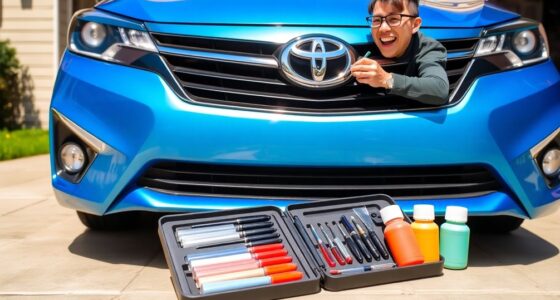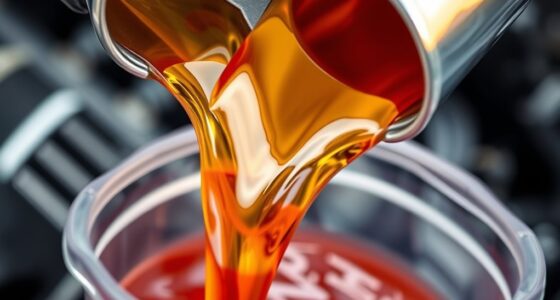When choosing an engine air filter, you have three main options: paper, oiled, and synthetic. Paper filters are affordable and effective at trapping dirt but need regular replacement. Oiled filters offer better filtration and can be cleaned and reused, though they cost a bit more. Synthetic filters provide the best balance of filtration, airflow, and durability, making them ideal for long-term use. If you want a clearer picture of which suits your needs, keep exploring the options.
Key Takeaways
- Paper filters are inexpensive and provide solid filtration but need frequent replacement.
- Oiled filters offer better particle trapping and can be cleaned and reused, balancing cost and performance.
- Synthetic filters deliver the best filtration efficiency and airflow, with longer lifespan and durability.
- Cost-wise, paper filters are cheapest upfront, while synthetic filters may save money over time due to durability.
- Choosing the right filter depends on your driving habits, budget, and desired balance of filtration and longevity.

Your engine air filter plays a crucial role in keeping your vehicle running smoothly by preventing dirt, dust, and debris from entering the engine. The type of filter you choose impacts not just how well your engine stays clean but also how efficiently it performs. When comparing paper, oiled, and synthetic filters, filtration efficiency is one of the most important factors to evaluate. Paper filters are designed with multiple layers of fibers that trap particles effectively, providing solid filtration efficiency at a low cost. They’re often the standard replacement option because they do a good job of blocking dirt without restricting airflow too much. Oiled filters, usually made of foam or cotton, enhance filtration efficiency by trapping smaller particles thanks to the sticky oil coating. This oil layer helps catch finer debris that a standard paper filter might let through, making them a popular choice for those seeking better protection. Synthetic filters, made from specialized fibers, tend to offer the best balance between filtration efficiency and airflow. They can trap tiny particles while maintaining high airflow rates, which supports engine performance. Plus, synthetic filters often last longer and maintain their filtration capabilities over time better than paper or oiled options. Additionally, some synthetic filters incorporate advanced filtration technology to further improve particle capture and airflow.
When evaluating cost comparison, paper filters generally come out ahead. They’re inexpensive upfront and widely available, making them the most budget-friendly option for most drivers. Oiled filters tend to cost a bit more initially but can be cleaned and reused multiple times, which might save you money in the long run if you’re willing to maintain them properly. Synthetic filters usually fall into the higher price range; however, their durability and superior filtration efficiency can justify the initial expense. They often need replacing less frequently, saving you money on replacements over the vehicle’s lifespan. It’s essential to weigh the upfront costs against long-term savings, especially if you drive extensively or in dusty environments. If you’re looking for the best filtration efficiency, synthetic filters are often worth the investment, but if you want an inexpensive, no-fuss solution, paper filters will serve you well. Oiled filters strike a middle ground, providing improved filtration and reusability at a moderate price. Ultimately, your choice depends on your driving habits, budget, and how much you prioritize filtration efficiency versus initial cost.
Frequently Asked Questions
How Often Should I Replace My Engine Air Filter?
You should replace your engine air filter every 12,000 to 15,000 miles or once a year, depending on your driving conditions. Check the air filter’s lifespan regularly, especially if you drive in dusty or polluted environments. Following proper replacement intervals guarantees your engine runs efficiently, improves fuel economy, and prevents damage. If you notice reduced airflow or increased engine dirt, replace the filter sooner for peak performance.
Can a Dirty Air Filter Affect Fuel Economy?
A dirty air filter can definitely hurt your fuel economy by restricting airflow, making your engine work harder and consume more fuel. It also impacts pollution control and air quality, as a clogged filter allows more pollutants into the engine and environment. Regularly replacing or cleaning your air filter improves efficiency, reduces emissions, and keeps your engine running smoothly, helping you save money and protect the environment.
Are Oiled Filters Safe for All Engine Types?
Perfectly, oiled filters aren’t necessarily safe for all engine types. You need to contemplate compatibility—some engines, like modern fuel-injected models, may struggle with oil buildup that hampers sensors or causes clogging. Before you install an oiled filter, check your engine type considerations and manufacturer recommendations. Properly matched filters protect your engine, preventing problems, and prolonging performance, so always verify compatibility to avoid avoidable engine issues.
Do Synthetic Filters Require Special Maintenance?
Synthetic filters do require some special maintenance to maximize their air filter lifespan. You should follow specific filter cleaning procedures, avoiding harsh chemicals that can damage the material. Regular inspections are essential, and if you notice dirt buildup, consider cleaning or replacing the filter sooner. Proper maintenance guarantees ideal airflow and engine performance, helping your synthetic filter last longer and perform efficiently.
Which Filter Type Offers the Best Airflow?
Think of your engine’s filter as a gatekeeper deciding who enters a busy marketplace. Synthetic filters, with their advanced filter material, offer the best airflow efficiency, allowing more air to flow freely into your engine. This means improved performance and fuel economy. They’re designed to maximize airflow without sacrificing filtration quality, making them the top choice if you want superior airflow efficiency and better engine breathing during every drive.
Conclusion
Choosing the right engine air filter depends on your driving needs and preferences. Paper filters are budget-friendly, oiled filters offer better filtration, and synthetic filters provide durability and high airflow. Remember, a chain is only as strong as its weakest link—so don’t skimp on your filter if you want your engine to run smoothly. Regularly replacing or cleaning your filter keeps your vehicle in top shape and saves you money in the long run.









